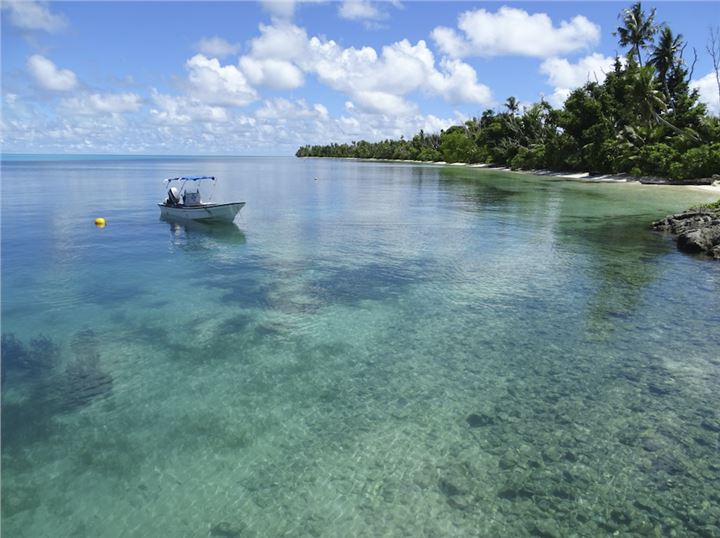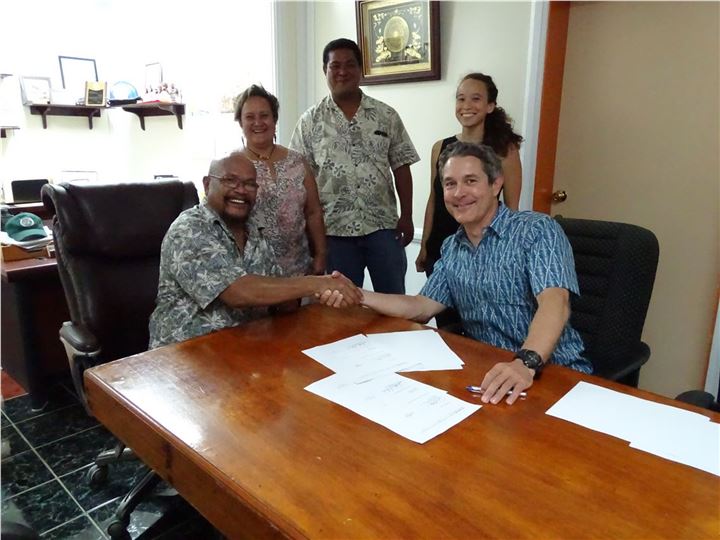Purpose
- Investigates the causes of economic imbalances.
- Explores and develops market-based solutions.
Summary
OneReef works to develop efficient, sustainable financing opportunities for Micronesian communities that want to protect their coral reefs. Many small-island nations are threatened by the combined impacts of climate change and human activity, and OneReef works closely with committed local partners to build scientific, enforcement, and community engagement programs to protect their valuable reef ecosystems.
In Palau, we are creating a financing opportunity that leverages public funds, via the “Green Fee,” with private philanthropy to support long-term conservation projects. This model can provide benefits far into the future, and inspire other Pacific Island nations to create similar conservation structures to protect their valuable marine resources.

Reefs and local enforcement boat at Angaur State
Description
Through the Alex C. Walker’s support over the past years, OneReef has engaged with Palau’s Ministry of Natural Resources, Environment, and Tourism (MNRET) to leverage public tourism funds with private philanthropic support, and we are in process of drafting a nationwide plan that includes our model as a key opportunity for long-term sustainable financing and management. More than 13 of Palau’s 16 states are now included in or under consideration for the Protected Areas Network (PAN) and are eligible for Green Fee funds, requiring a comprehensive and clear approach to allocating resources for long-term management each state’s protected areas. While some of our work has been delayed by the national elections in Palau in November 2016, we were able to select 5 PAN sites for evaluation and begin engagement with their community programs.
Significantly, in the last year we have also seen an emerging opportunity for the tourism-based “Green Fee” to support Palau’s broader national marine conservation goals. In late 2015, Palau’s President Remengesau designated the Palau National Marine Sanctuary (PNMS), one of the most ambitious pieces of marine legislation in the world. The PNSM outlaws fishing in 80% of Palau's marine waters and has placed strict fishing limits on the remaining 20%. Communities will require equipment, supplies, and training to be able to protect such a huge marine area, and our model can be a valuable tool in providing the required financing.
Additionally, in 2016 we had the opportunity to align our model not only with the community-based Green Fee system and the PAN, but also the national PNMS’s goals for protecting the entire Exclusive Economic Zone from overfishing and ecosystem degradation.
Accomplishments:
- Signed Memorandum of Understanding with Palau’s Ministry of Justice and the Executive Director of the Palau National Marine Sanctuary, showing alignment of our model with the Palau National Marine Sanctuary implementation
- Economic & management capacity analysis via the Review of Protected Areas Management Evaluation (PAME), to determine the enforcement funding and long-term management concerns at each site, with in-depth engagement of Koror State, Ngarchelong State, Anguar State, and Peleliu State Governors/representatives
- Contributed to PAN sustainable 5-year management plan formation through process led by The Nature Conservancy (TNC), to be supplemented by and help inform our ongoing sustainable finance analyses
- Minister of the Environment confirmed the selection of 5 prospective PAN sites for an in-depth sustainable financing evaluation, to be performed in partnership with MNRET. Current plans are to evaluate 3 of these options based on each program’s progress and availability of key stakeholders in each community and program.
- Angaur State
- Kayangel State
- Ngaraard State
- Ngardmau State
- Peleliu State

Signing the Memorandum of Understanding with Palau’s Vice President/Minister of Justice Antonio Bells in support of our work to sustainably finance conservation programs in support of community enforcement efforts.
Purpose
(1) investigate the causes of economic imbalances, particularly in relation to ecosystem services, climate change, food production, and other environmental matters
Reefs are globally valued and provide ecosystem services well beyond their geographic influence, yet they are largely are protected at a local scale. There is a huge imbalance between the worldwide ecological benefits and economic value of Palau’s corals, and the amount of local funding available to protect them, so our role is to connect global resources to enable long-term conservation.
Our community partners in Palau are fully committed to protecting their coral reefs, but we have seen that they lack the resources, expertise, and opportunity to create effective management programs that can adapt to changing climates and other external threats.
By aligning tourism fees with funds from OneReef’s supporters, we leverage money that comes directly from people who are using their resources - divers, snorkelers, and vacationers - with private philanthropists who also care about Palau’s reefs. This allows communities to see financial benefits from conservation and non-consumptive tourism and global audiences. It also creates a positive incentive to continue conservation efforts and ensure a steady stream of Green Fee support for their marine management projects.
(4) explore and develop market-based solutions
If successful, OneReef will establish a market-based solution to funding coral reef preservation, creating a self-sustaining source of funds for a large portfolio of marine conservation agreements (MCA).
By imposing a Green Fee on tourists and reinvesting those funds in environmental management, Palau has tapped a global market to protect their valuable reefs. However, we find that Green Fee funds alone are not sufficient to fully fund effective conservation programs. Moreover, relying exclusively on them exposes Palau and it’s reefs to tourism market volatility.
Through the Public-Private partnership we’re negotiating, we will strengthen this market-based solution by aligning private funds to fill gaps, using an incentive-based approach, and also seek the means to create some financial reserves, to weather tourism market downturns. Finally, we are adding affordable and innovative technologies and science support services, which reduces management costs and increases management efficacy.
Our solution: funding to fill gaps, with greater diversity of sources, some funds held in reserve to weather downturns, plus affordable tech and science to make management less expensive and measure impact.
By demonstrating the power of leveraging public money with private sources, Palau is setting a worldwide example of how conservation can, in fact, pay - and provide more sustainable benefits than a one-time extraction, which often results in uncompensated ecological damages.
Scope
Palau has consistently positioned itself as a world leader in marine conservation. Its Green Fee system is being considered in the nearby Federated States of Micronesia (FSM) to provide public funding for reef management, and we see an opportunity to expand our model to support a network of public-private funded programs in FSM. The Green Fee is a novel example of public-funded conservation investments, and it is thanks to organizations like the Alex C. Walker Foundation that it passed in the first place. We are proud to carry on the work of fully leveraging this public contribution to create sustainable programs at our community sites.
With the designation of the Palau National Marine Sanctuary, Palau also has the opportunity to demonstrate how a small island nation can make huge strides in protecting the global ocean. By refusing to sell commercial fishing permits within its territorial waters, Palau has effectively stated that it values its intact coral reef and fish more than it values extraction, and prioritized nonconsumptive uses over the single-use benefit of selling fish. It is a bold and exciting policy, and we are excited about aligning our model with the PNMS moving forward to see both nearshore and offshore benefits.
Information Dissemination
In 2016, Founder & CEO Chris LaFranchi gave a presentation about Palau’s public-partnership model at the International Coral Reef Symposium (ICRS), Bioneers Conference, and at a OneReef-sponsored event in Palo Alto, CA. We also just finished a revision of our website, which includes a new “Current News” and blogging section for disseminating information to the public. We will be posting information as appropriate to share with our supporters and the public through the blog, as well as on Facebook and through our newsletter and mailing lists.
Project Link www.onereef.org
Amount Approved$50,000.00
on 5/31/2016
(Check sent: 6/7/2016)